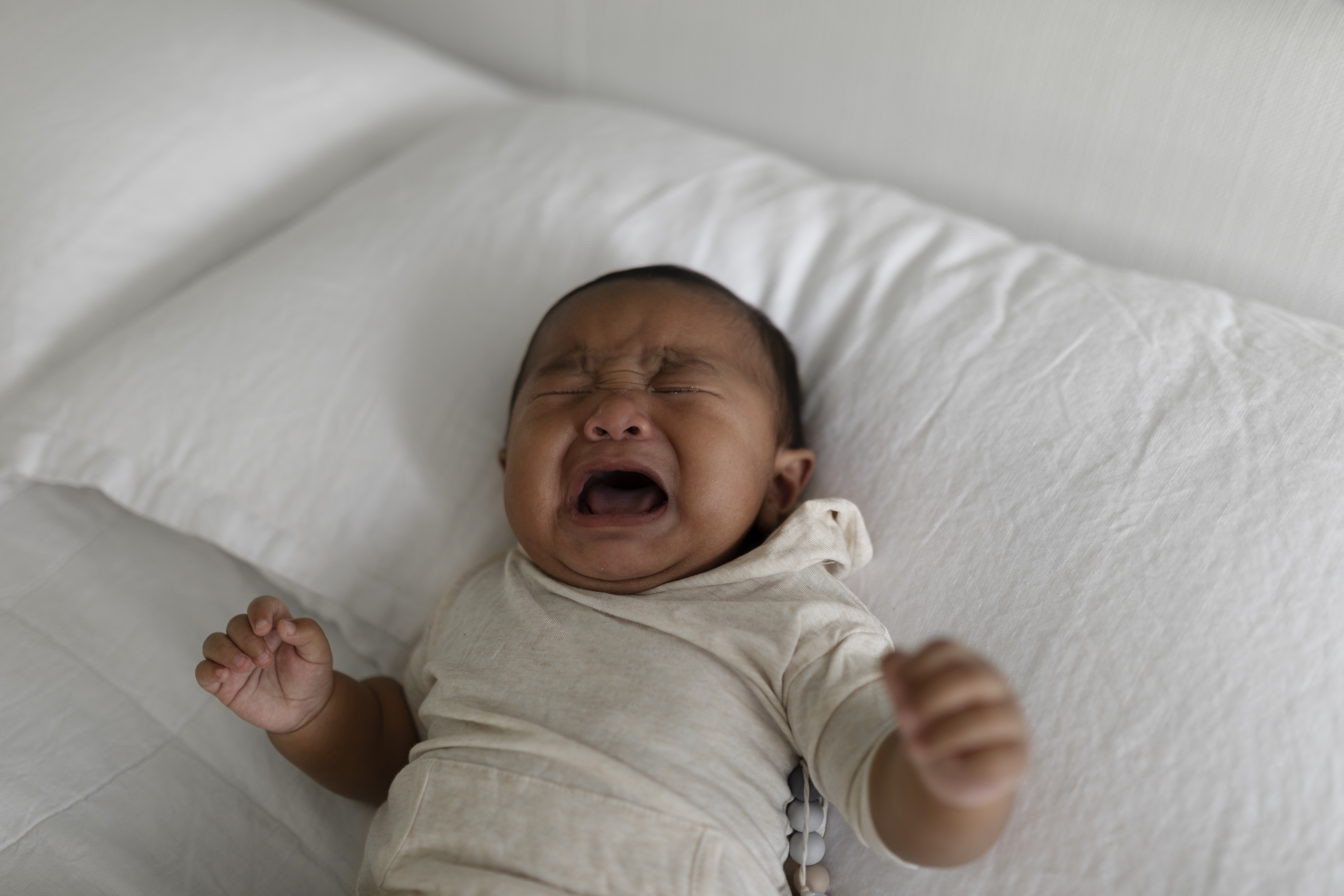Babies can also experience dehydration, though this is uncommon. An imbalance in bodily fluids, or dehydration, results from losing more fluid than it can take in.
Dehydration poses significant dangers to babies. Due to their elevated metabolic rate and limited stomach capacity, babies are more susceptible to fluid loss. This condition can lead to respiratory issues, impaired bodily functions, changes in skin appearance, reduced appetite, decreased activity levels, diminished urine output, and potentially life-threatening consequences.
Signs of dehydration in babies
Babies are very likely to become dehydrated faster than adults. The symptoms of dehydration range from mild to moderate and severe dehydration symptoms.
Mild dehydration:
- The baby is less alert than usual.
- Reduced frequency of urination.
- Dry and cracked appearance of the mouth.
- Decreased tear production during crying.
- Sunken fontanelles on the top of the head.
- If dehydration is due to diarrhea, stools will be loose; if caused by vomiting or insufficient fluid intake, there will be fewer bowel movements.
Severe dehydration:
- Exhibiting increased fussiness.
- Excessive drowsiness and reduced responsiveness are experienced during play or upon awakening.
- Displaying sunken eyes.
- Feeling cold and appearing pale in the hands and feet.
- Showing wrinkled skin.
- Urinating only 1-2 times per day.
- Lacking tears during crying
Read more: Dry Skin Not The Same As Dehydration Skin, This Is The Difference
Causes of Dehydration in Babies
The causes of dehydration in infants can vary, including:
Baby is not drinking enough breast milk or formula
It is important for babies to feed frequently to get enough fluids, either during direct feeding or bottle feeding. Parents must ensure that the baby has frequent feeding opportunities. Newborns should be fed at least every 2-3 hours, totaling about 8-12 feedings within 24 hours.
The baby does not breastfeed properly
Incorrect breastfeeding techniques can hinder your baby's intake of sufficient fluids. If you encounter difficulties with breastfeeding, it is advisable to seek assistance from a lactation consultant or a doctor who can assist in rectifying the issue.
Read more: Licking Blister In Babies, What Causes It?
Having diarrhea
Diarrhea can lead to considerable fluid depletion in babies. When a baby has diarrhea, it's important to monitor their fluid requirements by providing increased amounts of breast milk or formula to replenish the lost body fluids.
Fever
Babies under three months old are diagnosed with a fever if their rectal temperature reaches 38 degrees Celsius or higher. Fever in infants can lead to increased fluid loss through perspiration.
Similar to managing diarrhea, it's important to keep babies well-hydrated when they have a fever. Increasing breastfeeding frequency ensures the baby receives the extra fluids necessary to compensate for fluid loss caused by sweating and fever. Moreover, breastfeeding offers comfort to babies and can help slightly reduce their body temperature.
Excessive exposure to heat
Excessive heat exposure can increase babies' dehydration risk as their bodies are more susceptible to fluid loss through sweating. During hot weather or extreme heat exposure, keeping babies cool and well-hydrated is important.
Avoid frequent outdoor outings with the baby during hot weather, particularly when the sun's intensity is high. If going outside becomes necessary, ensure the baby is adequately shielded with a hat and loose and lightweight clothing, and use a pram or stroller cover for added protection.
Baby refuses to breastfeed because they don't feel well
Babies not feeling well due to illness may refuse to feed or drink milk. Ear infections, colds, coughs, teething discomfort, sore throats, mouth ulcers, bloating, gas, and colic can all contribute to difficulties or pain during baby feeding.
If your baby refuses to breastfeed due to feeling unwell, it's essential to determine the underlying cause and address it effectively. If unsure about the cause, promptly consult a doctor for proper evaluation and management.
Frequent episodes of vomiting
Frequent episodes of vomiting in a baby can lead to substantial fluid depletion and raise the chances of dehydration. Parents should carefully monitor for signs of dehydration and respond promptly if the baby continues to vomit.
If the baby is vomiting repeatedly and showing signs of dehydration, it is necessary to seek medical attention immediately. A doctor can assess the baby's condition and administer necessary treatment, including required intravenous fluids.
If you have questions regarding dehydration in babies, you can either visit a doctor or make use of the consultation features that are available in the Ai Care application by downloading it from the App Store or Play Store.
Looking for more information about pregnancy, breastfeeding, and the health of women and children? Click here!
- dr. Monica Salim
Donna Murray, RN, BSN (2022). Dehydration in Newborns and Infants. Available from: https://www.verywellfamily.com/dehydration-in-newborns-and-infants-431631
Kids Health (2023). Dehydration. Available from: https://kidshealth.org/en/parents/dehydration.html
Healthy Children.org (2019). Signs of Dehydration in Infants & Children. Available from: https://www.healthychildren.org/English/health-issues/injuries-emergencies/Pages/dehydration.aspx
Sara Novak (2022). Dehydration in Babies. Available from: https://www.whattoexpect.com/first-year/dehydration-in-babies
Mayo Clinic (2021). Dehydration. Available from: https://www.mayoclinic.org/diseases-conditions/dehydration/symptoms-causes/syc-20354086
Sanjeev Jain, MD, FAAP (2023). How Often and How Much Should Your Baby Eat?. Available from: https://www.healthychildren.org/English/ages-stages/baby/feeding-nutrition/Pages/how-often-and-how-much-should-your-baby-eat.aspx
Medline Plus (2023). Diarrhea in infants. Available from: https://medlineplus.gov/ency/patientinstructions/000691.htm
Kids Health (2022). Fever (High Temperature) In Kids. Available from: https://kidshealth.org/en/parents/fever.html











